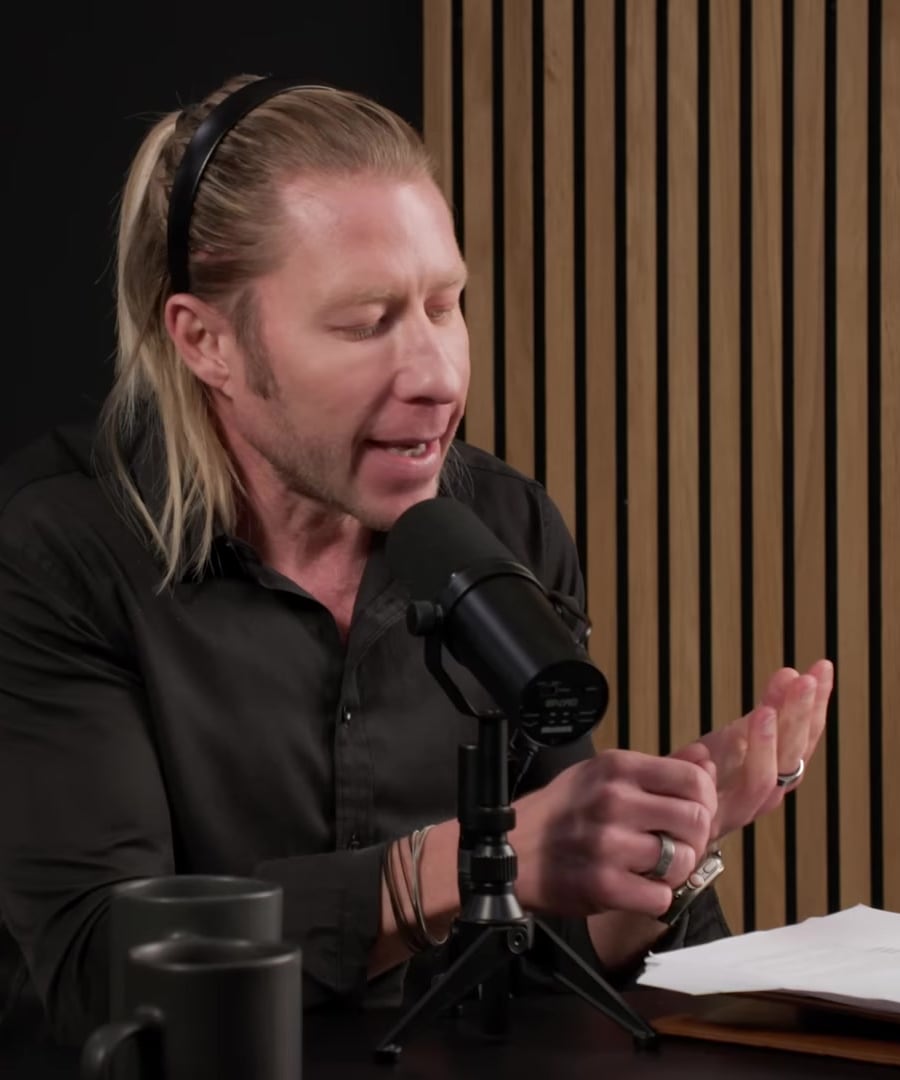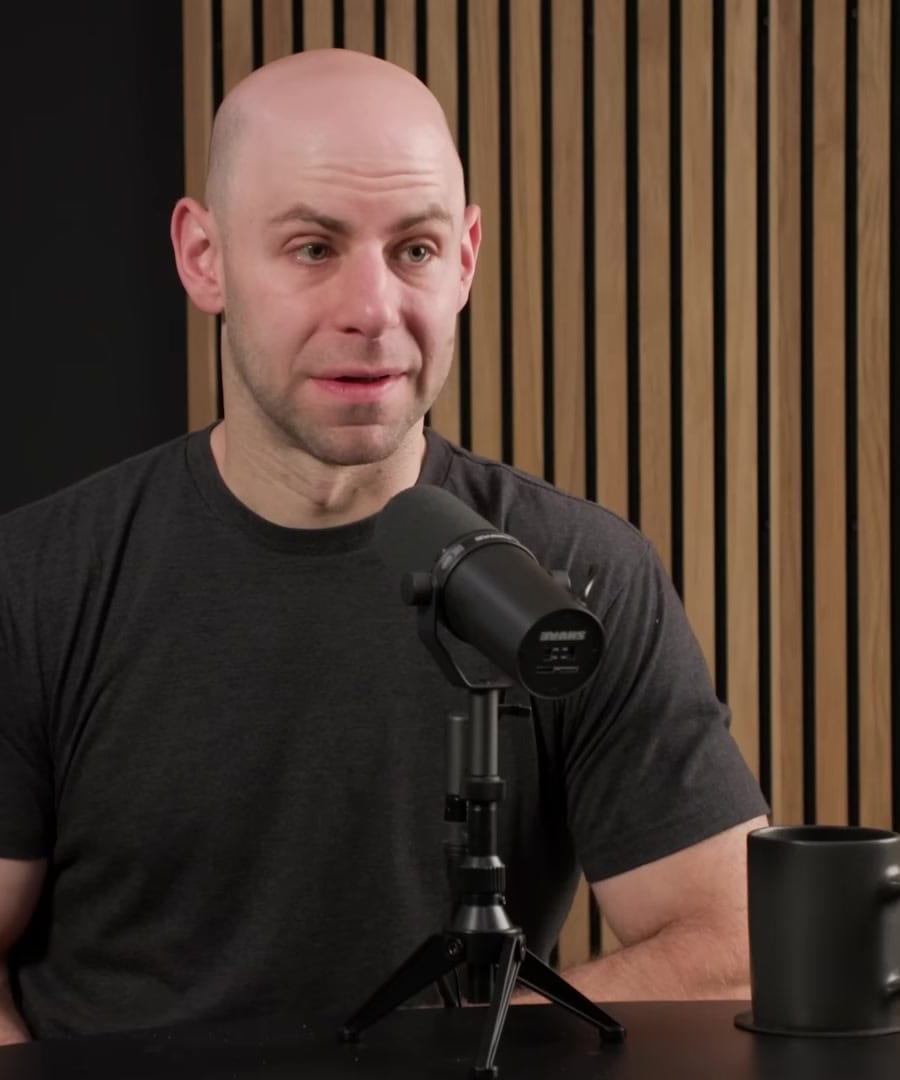Summarize episode Dr. Matt Walker: Improve Sleep to Boost Mood & Emotional Regulation | Huberman Lab Guest Series
Sources:
The episode titled "Dr. Matt Walker: Improve Sleep to Boost Mood & Emotional Regulation | Huberman Lab Guest Series" features a discussion between and on the integral connection between sleep, emotional regulation, and mental health.
Key Insights:
- Impact of Sleep on Emotional Regulation: describes how sleep affects our emotional stability, emphasizing that a lack of sleep leads to increased emotional reactivity, as demonstrated by a 60% increase in amygdala activity during sleep deprivation 1.
- Sleep and Mental Health: There's a strong bi-directional relationship between sleep and mental health. Poor sleep is associated with psychological disorders, and conversely, good sleep contributes to better mental health 2.
- Sleep Deprivation and Depression: discusses how sleep deprivation can temporarily increase reward sensitivity, which may alleviate symptoms of depression. However, this effect is not sustainable as a clinical treatment. Aligning sleep timing with one's natural chronotype (circadian rhythm) may help improve mood and diminish symptoms of depression 3.
The conversation not only delves into how sleep deprivation impacts emotional states but also offers actionable tools for enhancing sleep quality to improve overall mental wellbeing. There's an emphasis on understanding the individual's sleep needs and how adjusting sleep patterns according to one's natural chronotype can significantly aid emotional and mental health.
RELATED QUESTIONSTell me more about Dr. Matthew Walker.
Sources:
is a distinguished British neuroscientist, author, and professor of neuroscience and psychology at the University of California, Berkeley. He is renowned for his specialized research on the impact of sleep on physical and mental health. Dr. Walker has significantly contributed to the development of clinical assessment methods and treatment options for sleep disorders. Additionally, he is a public intellectual who hosts his podcast and explores various aspects of sleep science, sharing his knowledge widely to benefit public health and understanding.
RELATED QUESTIONSwhat is my chronotype
Sources:
Determining your chronotype involves understanding your natural sleep preferences and patterns, which are significantly influenced by genetics. Chronotype refers to whether you are a morning person, an evening person, or somewhere in between. This classification helps identify when you are most alert and when you prefer to sleep.
Your chronotype is largely influenced by genetics. There are at least 22 different genes that determine your natural sleep patterns, making it a trait you inherit, similar to eye color. This means that your sleep preferences are 'gifted' at birth and are mostly fixed, although they can be affected by environmental factors like light exposure and lifestyle choices 1.
Chronotypes can vary significantly among individuals. For example, extreme morning types might wake up as early as 4:00 AM and be most productive in the early hours, while extreme evening types may not feel ready for bed until 2:00 AM or later. The majority of people fit somewhere between these extremes 2.
To identify your chronotype, you can take a simple online test known as the Morningness-Eveningness Questionnaire (MEQ). This will help classify your sleep preference into one of the categories: extreme morning type, morning type, neutral, evening type, or extreme evening type. Based on your answers, the MEQ provides a score that categorizes your chronotype, assisting you in better understanding your natural rhythms and optimizing your schedule accordingly 2.
RELATED QUESTIONSHow can I find a chronotype test?
To find a chronotype test, you can search online for the "Morningness-Eveningness Questionnaire" (MEQ), which is a popular method to determine your chronotype. This questionnaire typically asks about your preferred times for different activities and sleep patterns. You can often find versions of this test available for free on sleep-related websites or through health and wellness platforms. Completing the questionnaire will provide you with a score that categorizes you as an extreme morning type, morning type, neutral type, evening type, or extreme evening type, helping you understand your natural sleep preferences and when you might be most productive.
RELATED QUESTIONSTips for productivity based on chronotype
Sources:
For optimizing productivity based on your chronotype, it's essential to align your work tasks with your natural rhythms.
Morning Types
If you identify as a morning person, your best analytical and creative thinking typically occurs in the morning. It's beneficial to protect the first few hours of your day for deep work that requires high concentration and critical thinking. You might consider scheduling meetings or less demanding tasks in the later part of the day when your energy starts to wane 1.
Evening Types
For those who are more energized in the evening, reversing the suggested schedule for morning types works better. Reserve the late afternoon and evening for tasks that require more intense focus or creativity. Utilize mornings for meetings or administrative tasks that don't demand peak mental performance 1.
General Tips
Regardless of your chronotype, it's recommended to:
- Protect deep work time: Block out interruptions during your peak performance hours, whether that's morning or evening.
- Schedule meetings wisely: Try to place meetings at times when you're naturally less inclined to focus deeply, maximizing your productivity across the day.
- Adapt as needed: While these guidelines generally apply, be attentive to your body's signals and adapt your schedule as necessary to maximize efficiency and well-being.
RELATED QUESTIONS
Summarize episode Dr. Matt Walker: Improve Sleep to Boost Mood & Emotional Regulation | Huberman Lab Guest Series
- RELATED QUESTIONS
Tell me more about Dr. Matthew Walker.
- RELATED QUESTIONS
what is my chronotype
- RELATED QUESTIONS
How can I find a chronotype test?
- RELATED QUESTIONS
Tips for productivity based on chronotype
- RELATED QUESTIONS





